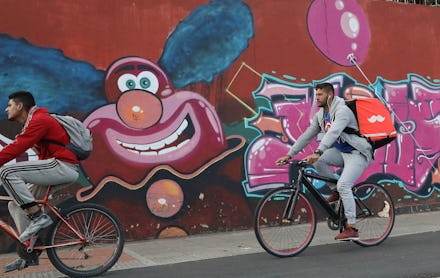Lizzo's Postmates tweet proves you should think twice before you drag a delivery worker

Earlier this week, the musician Lizzo caused a stir when she took to Twitter to accuse her Postmates delivery person of stealing her order. Critics pointed out that Lizzo leveraged her nearly one million followers against someone who works as a Postmate, and could have put the woman’s job, or her life, in danger.
Within 48 hours, Lizzo deleted the tweet and apologized, writing: “I apologize for putting that girl on blast. I understand I have a large following and that there were so many variables that could’ve put her in danger. Imma really be more responsible with my use of social media and check my petty and my pride at the door.”
Lizzo’s apology seems genuine, but the incident raises a larger point about the ways we’ve come to normalize complaining about gig economy workers on social media.
Nowadays, Twitter is the fastest and easiest way to contact many companies’ customer service departments. For those who have survived a bad travel experience with Delta, you know sending an irate tweet might be the only way to ensure you’re not spending thirty-six hours in the Atlanta airport. But when you tweet to companies like Postmates and Gruhub, you’re not just complaining about overbooked flights or an accidental double charge — you’re often complaining about workers who aren’t offered much in terms of protection, safety, or security.
Delivery workers operate in a largely unregulated industry that offers unstable pay, long hours, and oftentimes dismal work conditions. Peak delivery times are normally during the most inclement weather. During snow and rainstorms; when it is excessively hot, or in the freezing cold. One survey found that a third of delivery cyclists missed work last year due to a work-related injury.
On top of that, delivery people make most of their income through tips. Anywhere from 30 to 70 percent of their income. Some companies, Door Dash being the most notable of them, don’t ensure that their delivery people receive their full tips. There have even been reports of wage theft from restaurants who keep the tips their delivery cyclists earn. As the industry remains unregulated, it is easy for the workforce to be continually exploited.
Being a delivery cyclist is certainly not an easy gig, and before they even make it to your door, most have had to deal with a lot, and still might only make it out with a fraction of a 15% tip. A New York Times story from July showed just how harrowing the conditions could be for a delivery cyclist in New York City. Speed racing from one restaurant to the next, deliveries across town for no tip, showing up to closed restaurants only to earn $0.63 for 20 minutes of your time. None of which makes allegedly stealing a customer’s food okay. But is the best way to deal with the inconvenience tweeting about it?
“We always want for our diners to have the best experience possible, and whenever things don’t go as planned, we appreciate hearing feedback and work hard to make it right,” a GrubHub representative said in a statement to Mic. “It's best for people to contact us through the help page of our app/website or by clicking on the "help" link on their order confirmation email.”
GrubHub also says that they take all complaints about service seriously. “We thoroughly investigate all complaints and always reach out to all parties to learn what happened from each side, including connecting with the delivery partner. It's important to us that we hear from everyone involved in a situation,” their email continued.
One danger of airing grievances with a delivery person on social media is the lopsided power dynamic it creates. Your food could be late or never arrive because the delivery person was in an accident or hurt. By pressuring a company like Postmates or GrubHub on Twitter, you effectively silence the laborer in the situation and create the possibility of economic loss for them.
The public display of customer service issues can also come with a heightened expectation of retribution. There were threats of violence from enthusiastic Lizzo stans under her now-deleted tweet. It’s what happens when human labor is so commodified and devalued that underpaid workers get attacked on a platform by everyone from a pop star to an office employee waiting for his lunch.
There aren’t a lot of immediate solutions when it comes to the systemic issues within the food delivery industry, but there are ways to ensure you’re limiting harms when you choose to participate. Always tip in cash, always tip 20 percent or more — especially if there is inclement weather. If you have an issue with your order, try to leave the delivery person out of it unless they themselves did something to harm you. Delivery services exist in cities that were never designed to have that commodity on such a large scale so, sometimes, your food will be delayed.
In a time when the gig economy is redefining the way millions of people make ends meet, it’s probably better to approach any delivery snafus with more compassion than rage.